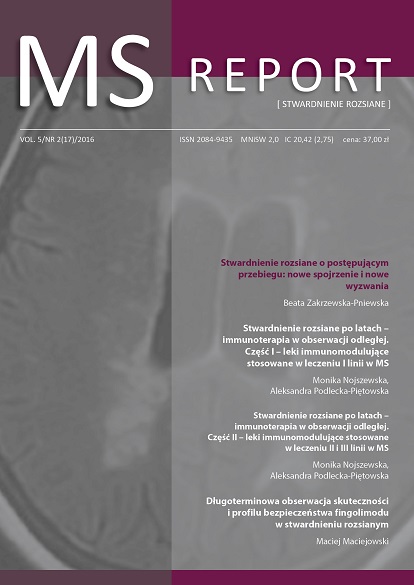Long-term follow-up of clinical trials in multiple sclerosis therapies. Part I – first-line treatment (disease-modifying therapy) Review article
Main Article Content
Abstract
Multiple sclerosis (MS) is a lifelong demyelinating disease of the central nervous system (CNS) and a leading cause of disability in young and middle-aged people in the developed world. This is connected with social, medical and economic burdens. Long-term disability progression is a major issue in MS and the prevention of it is the most important goal of therapy in this disorder. Results of short-term studies of the disease-modifying drugs indicate its efficacy in reducing relapses and delaying disability progression (usually over a two-year period). However it is the long-term observational studies and postmarketing prospective registers, that allow us to assess the efficacy and safety of disease-modifying therapies in long-term perspective and in larger and more variable groups of patients. In this part of the article results of the long-term follow-up studies and prospective registers for first-line treatments (interferons β, glatiramer acetate, dimethyl fumarate and teriflunomide) are being discussed.
Article Details
Copyright © by Medical Education. All rights reserved.
References
2. Kingwell E., van der Kop M., Zhao Y. et al.: Relative mortality and survival in multiple sclerosis: findings from British Columbia, Canada. J. Neurol. Neurosurg. Psychiatry 2012; 83: 61-66.
3. Sadovnick A.D., Eisen K., Ebers G.C. et al.: Cause of death in patients attending multiple sclerosis clinics. Neurology 1991; 41: 1193-1196.
4. Grytten Torkildsen N., Lie S.A., Aarseth J.H. et al.: Survival and cause of death in multiple sclerosis: results from 50-year follow-up in Western Norway. Mult. Scler. 2008; 14: 1191-1198.
5. Freedman M.S.: Long-term follow-up of clinical trials of multiple sclerosis therapies. Neurology 2011; 76(supl. 1): s26-s34.
6. Rio J., Comabella M., Montalban X.: Multiple sclerosis: current treatment algorithms. Curr. Opin. Neurol. 2011; 24: 230-237.
7. Tramacere I., Del Giovane C., Salanti G. et al.: Immunomodulators and immunosuppressants for relapsing-remitting multiple sclerosis: a network meta-analysis. Cochrane Database of Syst. Rev. 2015, Issue 9. Art. No.: CD011381 [doi: 10.1002/14651858.CD011381.pub2].
8. Confavreux C., Vukusic S., Moreau T. et al.: Relapses and progression of disability in multiple sclerosis. N. Engl. J. Med. 2000; 343: 1430-1438.
9. Trojano M., Paolicelli D., Tortorella C. et al.: Natural history of multiple sclerosis: have available therapies impacted long-term prognosis? Neurol. Clin. 2011; 29: 309-321.
10. Rudick R.A., Cutter G.R., Baier M. et al.: Estimating long-term effects of disease-modifying drug therapy in multiple sclerosis patients. Mult. Scler. 2005; 11: 626-634.
11. Bermal R.A., Weinstock-Guttman B., Bourdette D. et al.: Intramuscular interferon beta-1a therapy in patients with relapsing-remitting multiple sclerosis: a 15-year follow-up study. Mult. Scler. 2010; 16: 588-596.
12. Kappos L., Traboulsee A., Constantinescu C. et al.: Long-term subcutaneous interferon beta-1a therapy in patients with relapsing-remitting MS. Neurology 2006; 67: 944-953.
13. Kappos L., Kuhle J., Multanen J. et al.: Factors influencing long-term outcomes in relapsing-remitting multiple sclerosis: PRISMS-15. J. Neurol. Neurosurg. Psychiatry 2015; 86: 1202-1207.
14. Ebers G.C., Traboulsee A., Li D. et al.: Analysis of clinical outcomes according to original treatment groups 16 years after the pivotal IFNB-1b trial. J. Neurol. Neurosurg. Psychiatry 2010; 81: 907-912.
15. Ziemssen T., Schrempf W.: Glatiramer acetate: mechanisms of action in multiple sclerosis. Int. Rev. Neurobiol. 2007; 79: 537-570.
16. Ford C., Goodman A.D., Johnson K. et al.: Continuous long-term immunomodulatory therapy in relapsing multiple sclerosis: results from the 15-year analysis of the US prospective open-label study of glatiramer acetate. Mult. Scler. 2010; 16: 342-350.
17. Linker R.A., Lee D.H., Ryan S. et al.: Fumaric acid esters exert neuroprotective effects in neuroinflammation via activation of the Nrf2 antioxidant pathway. Brain 2011; 134: 678-692.
18. Gold R., Kappos L., Arnold D.L. et al.: Placebo-controlled phase 3 study of oral BG-12 for relapsing multiple sclerosis. N. Engl. J. Med. 2012; 367: 1098-1107.
19. Fox R.J., Miller D.H., Phillips J.T. et al.: Placebo-controlled phase 3 study of oral BG-12 or glatiramer in multiple sclerosis. N. Engl. J. Med. 2012; 367: 1087-1097.
20. Gold R., Giovannoni G., Phillips J.T. et al.: Efficacy and safety of delayed-release dimethyl fumarate in patients newly diagnosed with relapsing-remitting multiple sclerosis (RRMS). Mult. Scler. 2015; 21: 57-66.
21. Gold R., Giovannoni G., Phillips J.T. et al.: Sustained effect of delayed-release dimethyl fumarate in newly diagnosed patients with relapsing-remitting multiple sclerosis: 6-year interim results from an extension of the DEFINE and CONFIRM studies. Neurol. Ther. 2016 [epub ahead of print].
22. Oh J., O’Connor P.W.: Teriflunomide in the treatment of multiple sclerosis: current evidence and future prospects. Ther. Adv. Neurol. Disord. 2014; 7: 239-252.
23. Confavreux C., Li D.K., Freedman M.S. et al.: Long-term follow-up of a phase 2 study of oral teriflunomide in relapsing multiple sclerosis: Safety and efficacy results up to 8.5 years. Mult. Scler. 2012; 18: 1278-1289.
24. O’Connor P., Wolinsky J.S., Confavreux C. et al.: Randomized trial of oral teriflunomide for relapsing multiple sclerosis. N. Engl. J. Med. 2011; 365: 1293-1303.
25. Confavreux C., O’Connor P., Comi G. et al.: Oral teriflunomide for patients with relapsing multiple sclerosis (TOWER): a randomised, double-blind, placebo-controlled, phase 3 trial. Lancet Neurol. 2014; 13: 247-256.
26. O’Connor P., Comi G., Freedman M.S. et al.; Teriflunomide Multiple Sclerosis Oral (TEMSO) Trial Group and the MRI-AC in Houston, Texas: Long-term safety and efficacy of teriflunomide. Nine-year follow-up of the randomized TEMSO study. Neurology 2016; 86: 1-11.
27. Comi G., Freedman M.S., Kappos L. et al.: Pooled safety and tolerability data from four placebo-controlled teriflunomide studies and extensions. Mult. Scler. Relat. Disord. 2016; 5: 97-104.

